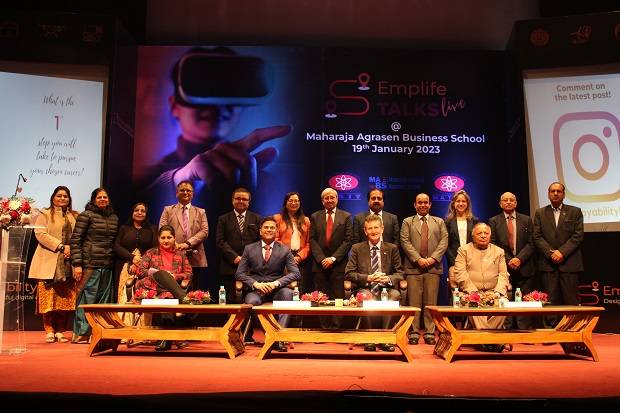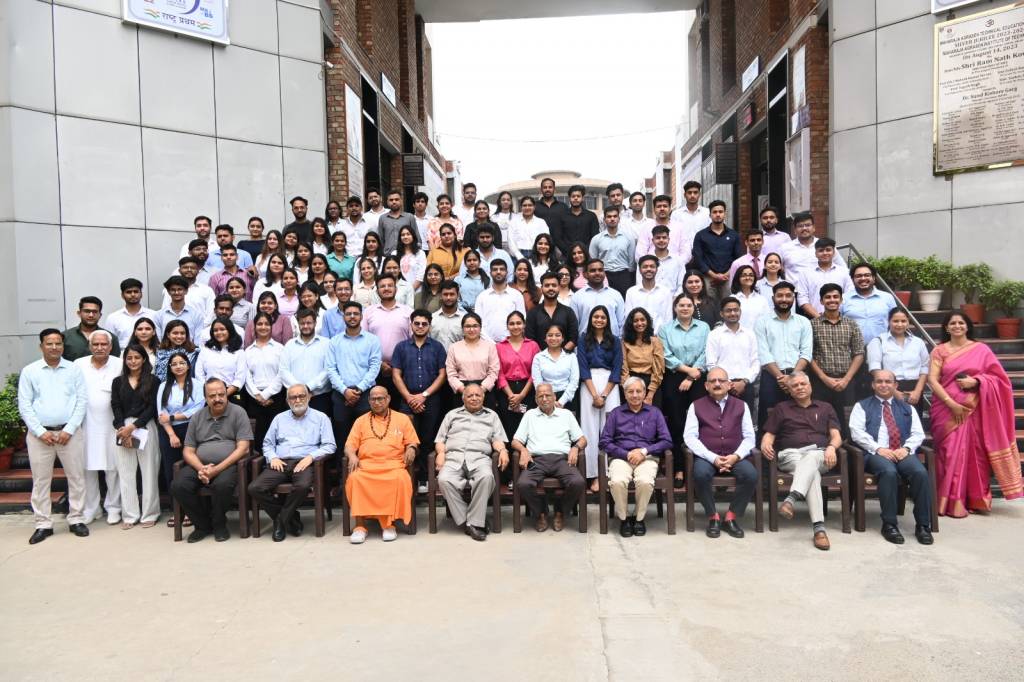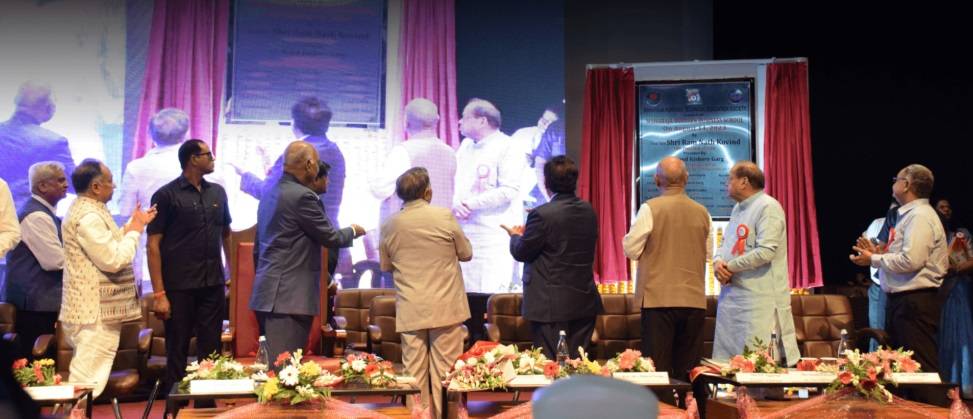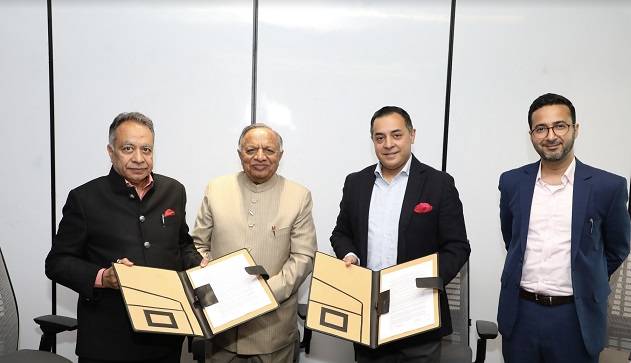Maharaja Agrasen Business School Hosts Orientation Programme ‘Adhwan’ for PGDM Cohort 2026
August 2, 2024: Maharaja Agrasen Business School (MABS) hosted an orientation programme, named ‘Adhwan’ for its newly admitted PGDM 2024-26 batch. The event was organised after the completion of a 40-day onboarding program, ‘Buniyaad’, that was organised to strengthen the fundamentals of management and create a common foundation for students from diverse backgrounds before starting the PGDM program. It included sessions on leadership, current affairs, company presentations, quizzes, and an Entrepreneurship Day.
Adhwan 2024 was initiated with the ceremonial lighting of the lamp and Saraswati Vandana. The chief guests of the programme included Dr. Nand Kishore Garg, Founder Chairman & Chief Advisor MATES, Chancellor MAU, and several other eminent personalities. Dr. Nand Kishore Garg, through his speech, urged students to give back to society and embrace the philosophy of "Vasudev Kutumbhkam. Further, Prof. (Dr.) Sanjiv Marwah, Director of MABS, introduced MABS Triedge, a
Maharaja Agrasen Business School Hosts Orientation Programme ‘Adhwan’ for PGDM Cohort 2026
August 2, 2024: Maharaja Agrasen Business School (MABS) hosted an orientation programme, named ‘Adhwan’ for its newly admitted PGDM 2024-26 batch. The event was organised after the completion of a 40-day onboarding program, ‘Buniyaad’, that was organised to strengthen the fundamentals of management and create a common foundation for students from diverse backgrounds before starting the PGDM program. It included sessions on leadership, current affairs, company presentations, quizzes, and an Entrepreneurship Day.
Adhwan 2024 was initiated with the ceremonial lighting of the lamp and Saraswati Vandana. The chief guests of the programme included Dr. Nand Kishore Garg, Founder Chairman & Chief Advisor MATES, Chancellor MAU, and several other eminent personalities. Dr. Nand Kishore Garg, through his speech, urged students to give back to society and embrace the philosophy of "Vasudev Kutumbhkam. Further, Prof. (Dr.) Sanjiv Marwah, Director of MABS, introduced MABS Triedge, a unique teaching and learning pedagogy built on three pillars: a strong industry-academia interface, a tech-savvy curriculum, and a beyond-academic learning environment.
Mr. Vishal Sehgal, President of the Harvard Club of India, served as the Guest of Honor. He advised students to build networks with their peers and mentioned the importance of continuous learning. Mr. Pradeep Panday, Director of the Learning & Development Academy at Grant Thornton Bharat, highlighted the importance of good decision-making skills.
Maharaja Agrasen Business School Conducts Employability Seminar

January 19, 2023: Maharaja Agrasen Business School held its inaugural employability seminar with the theme "Emptalks Live- How to get workplace ready?" with an attendance of 800 students.
Two sessions made up the entire event. The first session's main topic was "Building the Global Talent in India." Dr. Nand Kishore Garg, the founder and chairman of MATES, Prof. Duncan Bentley, the vice chancellor and president of Federation University in Australia, and Dr. Manish Malhotra, the chairman and chief executive officer of Employability.life in the UK, served as the panellists for this discussion. Discussion of "How does experience in education play a role in improving graduate employability" was the main topic of Session 2.
The participants for this discussion included Supriyo Chaudhari, president of Employability.life, Dr. Sanjiv Marwah, director of MABS, Ms. Carolyn Chong, deputy vice chancellor (global and engagement) at Federation University in Australia, and Vinit Sinha, director of cybersecurity at Mastercard. Neha Khanna, Executive Producer and Senior Anchor for WION, moderated both sessions.
Dr. Nand Kishore Garg emphasised the need to examine talent development from a wider perspective, including the consequences for developing India's most productive graduates. He focused on creating the best plans for future educational institutions, including the co-operative model, and strategies to ensure that students obtain opportunity to increase their employability, among other important debate points.
He said that in 1972, when he had completed my graduation, he never thought that life would change so much in the next 50 years. He then explained the importance, connotation and objective of education system in India. He explained the he had witnessed vast and impressive innovations in technology and social changes with changing times. With that, he contrasted the need of India and Australia and said that in India, we need to be more self-reliant and in order to make that happen we need employability, a start-up ecosystem and futuristic technology. He spoke about brain drain and mentioned initiatives taken by the present Govt to make programmes industry relevant in the new education policy. Dr Nand Kishore Garg emphasised on the importance of global skills while developing good human values as the centre stage for learning systems. In the end, he concluded by saying that a student should be a good human first as humanity is priceless and a key to maintaining peace in every way.
Professor Duncan Bentley, Vice-Chancellor of Federation University Australia, said: “In a first for Australia, the globally recognised co-operative education model will be embedded across all Federation programs from 2025. We have a longstanding relationship with India and we look forward to playing our part in realising its vision to be the ‘skills capital’ of the world.” “Additionally, this collaboration will provide an opportunity for eligible students to visit and work on projects within the IBM emerging technologies hub and in Australia’s largest university technology park located at Federation’s campus in Ballarat, Victoria.”
Dr. Manish Malhotra of Employability.life said: “India’s dream of building a $5 Trillion economy rests on ensuring that its youth engages productively and meaningfully. Employability.life, working in partnership with the country’s most forward-thinking education institutions and its global network of entrepreneurs, educators and employers, wants to empower the students to lead their country towards that goal.”
Vinit Sinha, Director at MasterCard represented Industry and said, “Industry looks for a collaborative team player. It is not you, it is us.” What you are being taught today will stay with you as fundamentals. But, over the next 10-15 years, you will have to continuously upgrade yourself. He explained that students are taught fundamentals today but as time changes new fundamentals and skills are required, but that does not mean that we should underestimate the importance of fundaments as the stronger the roots stronger the tree. He also advised students on key skills to be developed for better employability.
Prof. (Dr.) Sanjiv Marwah, Director of Maharaja Agrasen Business School said that “Industry and academia have a lead follow cycle. The industry and academia need to change their relation, no more donor-taker relation, it could be collaborative.” With recent pandemic years, the skills are becoming obsolete quickly.
India and academics have different roles to play, but a collaborative role can help live projects by academics connect students with the industry. He explained that industry and academia need to come together and work as a whole in order to provide experience and practical knowledge to students as even though both, education and industry have a different roles to play, it is very important for a student to work and receive the actual experience that only textbooks cannot provide. He spoke on reducing the half-life of skills due to technological advancements and mentioned that the Maharaja Agrasen Business school provides various add-on courses for skill enhancements and provides career counselling for better employability.
Carolyn Chong, Pro- VC Federation University said, as time changed, we witnessed evolutions and underlying issues bought up to the surface. Several issues which were neglected earlier are discussed and prioritized now. We hear people talking about climate change, the environment and sustainability. India is developing and advancing impressively.
All the other speakers focussed on new-age partnerships to improve the employability skills of Indian students to get ready for global employability challenges and prepare for the same parallel with their academics in a college.
- Chat with our counsellor
- Get your personalised list of colleges & exams matching your preferences
Know more about this College
- Maharaja Agrasen Business School News & Events
- Maharaja Agrasen Business School Scholarship Details
- Maharaja Agrasen Business School Courses and Fees 2025
- Maharaja Agrasen Business School Placement Trends & Updates
- Maharaja Agrasen Business School Answered Questions
- Maharaja Agrasen Business School Faculty Details & Reviews
- Maharaja Agrasen Business School Infrastructure Details & Reviews
Student Forum
Answered 2 weeks ago
Yes, it is worth pursuing MBA at Maharaja Agrasen Business School as it is mainly concerned with the Business Management stream and offers AICTE-approved courses to students. The college offers an MBA programme to students for a duration of 2 years. Maharaja Agrasen Business School courses are offer
A
Contributor-Level 10
Answered 2 weeks ago
The course fee for Maharaja Agrasen Business School Delhi MBA programme is INR 9.4 lakh. The college offers an MBA programme for 2 years in the full-time mode. It is divided into six trimesters with a 2-month internship after the completion of the first year and the beginning of the second year. The
M
Beginner-Level 5
Answered 2 weeks ago
Yes, Maharaja Agrasen Business School is a good college for MBA as it is mainly concerned with the Business Management stream and offers only 1 programme to students at the PG level. MABS Delhi strives to provide quality education to students with practical and theoretical knowledge about the indust
A
Beginner-Level 5
Answered 2 weeks ago
Yes, there are various sports opportunities after taking admission in Maharaja Agrasen Business School as the college offers outdoor games facilities such as tennis, basketball, and volleyball court along with various indoor games such as table tennis, etc. The college campus is spread across 8.5 ac
S
Beginner-Level 5
Answered a year ago
Maharaja Agrasen Business School accepts CAT score for admission to its PGDM programme.The minimum score needed on the CAT to get admitted to an MBA programme fluctuates from year to year; the cutoff for the prior year is 60%. Other than CAT, the school also accepts multiple exams other tham CAT i.e
R
Contributor-Level 10









Is it worth pursuing MBA at Maharaja Agrasen Business School?